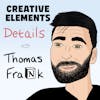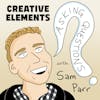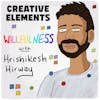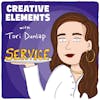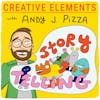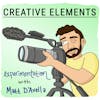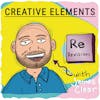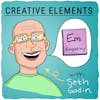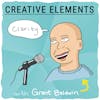
#6: Grant Baldwin – Having a professional work ethic, getting clear on your message, and how to get paid to speak
Play EpisodeGrant Baldwin is the creator of The Speaker Lab and author of The Successful Speaker: Five Steps for Booking Gigs, Getting Paid, and Building Your Platform.
Grant Baldwin is the creator of The Speaker Lab and author of The Successful Speaker: Five Steps for Booking Gigs, Getting Paid, and Building Your Platform.
But before either of those things existed, Grant was on the road. He’s delivered nearly 1,000 presentations to over 500,000 people across 47 states. He’s been the keynote for events with audiences as large as 13,000 people.
In this episode, we talk about getting professional results, his SPEAK framework for getting paid speaking gigs, and why Clarity is at the root of it all.
Transcript and show notes can be found here
***
LISTENER SUPPORT
Join our community on Facebook
Support this show through Buy Me A Coffee.
***
SPONSORS
Try Podia and save 15% for life as a Creative Elements listener
Start your free trial of SavvyCal and get your first month free using promo code ELEMENTS
***
ABOUT JAY CLOUSE
Subscribe to my weekly newsletter
Enroll in my course on podcasting, Podcast Like The Pros
***
PODGLOMERATE NETWORK
This show is a part of the Podglomerate network, a company that produces, distributes, and monetizes podcasts. We encourage you to visit the website and sign up for our newsletter for more information about our shows, launches, and events. For more information on how The Podglomerate treats data, please see our Privacy Policy.
Since you're listening to Creative Elements, we'd like to suggest you also try other Podglomerate shows surrounding entrepreneurship, business, and careers like Rocketship.fm and Freelance to Founder.
Learn more about your ad choices. Visit megaphone.fm/adchoices
Grant Baldwin 0:00
Event planners are in the risk-mitigation business. Whenever they put you up on stage, they are taking a massive risk. If you do a good job, the person that hired you looks like the hero.
Jay Clouse 0:12
Welcome to Creative Elements, a show where we talk to your favorite creators and learn what it takes to make a living from your art and creativity. I'm your host, Jay Clouse. Let's start the show. Hello, hello. Thanks for tuning into Creative Elements. For a lot of creators, speaking becomes an area of interest. As you build up a reputation for doing good work, having a lot of experience or a good perspective, you'll probably begin getting some opportunities to speak. It can be a lot of fun, a whole audience of people sitting there watching you and listening to what you have to say. It can be really exciting to think about a world where you're being paid to speak. If you can make a few hundred or a few thousand dollars per month by getting up on stage to talk to other people, that may sound like a good deal compared to what your typical paying gigs are like. But usually, those first speaking opportunities are unpaid. And creators struggle to make the leap from free speaker to paid speaker. So in today's episode, I'm talking with Grant Baldwin, the creator of the Speaker Lab and author of "The Successful Speaker: Five Steps for Booking Gigs, Getting Paid, and Building Your Platform." But before either of those things existed, Grant was on the road. He's delivered nearly 1,000 presentations to over 500,000 people across 47 states. He's been the keynote speaker for events with audiences as large as 13,000 people. Here's a clip from Grant's own speaking reel.
Grant Baldwin 1:44
When you get ready to checkout at the grocery store, you play this mental competition against the store. And so what you do is you like you got to walk up, there's like 47 available lanes, but you can't pick one, like you got to walk through, you do start doing, you start figure Like how many lanes are available, you start, you start looking for the crazy coupon lady. Like you don't, you can't get behind it, like if you see someone with a pink trapper keeper, don't get behind that person in line. Like Barbara, just scan the UPC, let's go. It's really hard to be fully present, because a lot of times our minds are in one of two places: either I'm thinking about where I just came from--kay, just got out of that session, kay, I just talked to the person, I just read that email, just got off the phone call--or I'm thinking about where I'm going--kay, as soon as we're done here, I gotta make sure to talk to that person before I go, what are we doing for dinner tonight. I'm thinking about where I came from. I'm thinking about where I'm going. It's really difficult to be fully present.
Jay Clouse 2:39
Grant is synonymous with speaking. Through his podcast and blog, The Speaker Lab, he has coached and worked with thousands of other speakers. And in this episode, we talk about his path to professional speaking, the mistakes newbie speakers make, his five step SPEAK framework, and how clarity has helped him develop his expertise as a speaker. Even if you don't want to become a speaker yourself, this episode offers a lot of perspective about communication, finding clients, building your own expertise and more. I'd love to hear your thoughts on this episode as you listen. You can find me on Twitter or on Instagram @JayClouse. Shoot me a note, let me know what you think. But now let's jump in and talk with Grant.
Grant Baldwin 3:25
In high school, I was really involved in my local church, my youth pastor had a big impact in my life, and was a phenomenal speaker. And that whole world just really resonated with me, like I want to do that, I want to be a youth pastor, I want to speak, I want to help students. So that was kind of the path I was on. In college, I actually worked for a guy who was a full time speaker. And so I kind of got to help him behind the scenes a little bit and with like contracts and travel and logistics and that sort of thing. And then worked at a local church as a youth pastor, and so had a lot of opportunities to speak and speak primarily to high school and college students. And then from time to time we get to speak on the weekend in big church. And just really enjoyed speaking. Speaking was one of the things that I wanted to do more of, and felt like I was decent at. But I just had no idea how to book gigs. And so one of the lines we use a lot is, I felt like I had the potential, but I needed the plan. I had the potential, but I needed the plan, meaning I felt like I was a decent speaker, I wasn't the world's greatest speaker, but I knew there was something there. And wanted to do more of it. Just no idea what do you do from that? How do you find gigs? How do you book gigs? How much you charge? Who hires speakers? Like, how does that world work? And so started stalking as many other speakers as I could, just trying to figure out, like, how does this world work, can someone makes sense of those for me? Because at the time, there wasn't any books or podcasts or training resources about, you know, especially the, the business side of speaking, and finding and booking gigs. And so, we learned a lot about the speaking world, started booking a bunch of gigs, and eventually got to the point where I was doing 60, 70 gigs a year. Loved it and started having a bunch of people who were in a similar spot of where I was when I got started asking me like, hey, I want to be a speaker. How do you do that? How does that work? And so we started teaching some of that, and that's at the core of what we do today is we teach people through our company, The Speaker Lab and through the new book, "The Successful Speaker," teach people how to find and book speaking gigs.
Jay Clouse 5:08
At a point where you're doing 60 to 70 gigs a year, how much travel is involved in that?
Grant Baldwin 5:12
I mean, it's definitely a decent amount. I think where people can get, like, there's a misconception of like, oh, wow, in order to do 60 to70 gigs, you must be gone, you know, 100 nights, 150, 200 nights. And most the time, it was not like that. Like to do 60, 70 gigs, it was probably 80 nights or so, give or take. And so, yes, it's a lot of travel, and yes, it's being gone a lot. But it's also being home a lot. So if you look at through the lens of like, Okay, if you had to work for your job, you are gone 80 nights a year, but then the rest of the time you were home, you worked from home, you're with your family, like that's a lot of time home as well. So it was, it was a lot, but it was also like it would kind of come and go in spurts, where speaking can be very seasonal and somewhat cyclical where you may be really, really busy for a month or two and you know, you're you're gone for two nights and then you're home for two nights, and then you're gone for three nights and then you're home for a night, and then you're on for a night and then you're home. You know, so you're kind of like bouncing in and out regularly. But then it may be something where like, December historically around the holidays is just slow. So you may be like, December I'm home the entire month, not going anywhere. And my wife is going, Don't you have some gig you can go do, please go somewhere anywhere. So you have like, you have like both sides of it. And it's definitely the, the trade off there. But so you're on the road, but that's you know, that's part of what you sign up for.
Jay Clouse 6:34
Something specific about your background that pops out to me, because I've seen it before, this history of going to Bible College. A couple of my good friends, who are paid professional speakers, at least part time have a similar background themselves, either going to study themselves or their dad was a pastor. And so I've started to build this story in my mind that there must be something taught in Bible College about how to write a good sermon that is probably really good advice for communication or speaking.
Grant Baldwin 7:01
Yeah, I don't, um, I don't remember anything that, that helped me in terms of like putting together the presentation. Here's what I think where people like pastors who are speaking regularly, where that can help them in the speaking business in the future, is they just get a lot of reps, they get a lot of at bats, you know. So if you were, let's say, you know, you were a banker, and you worked at a local bank as a branch manager or something or a teller, whatever you may do, and that was your, you know, Monday through Friday, nine to five type gig, there's not a lot of opportunities for you to stand up in front of an audience of a handful or a whole bunch of people and speak. You know, maybe like, once a year at the company conference or at the, you know, some association event that you have to be at, maybe you can do something. So like, you might be able to come up with a handful of things that you, as a part of your job, that you speak at, you know. But maybe it's probably less than five. Whereas at being an administrator from like a pastoral perspective, depending on the nature of your role, I was speaking every week, every week I was, I was speaking. And it wasn't just, you know, hey, I have this one talk that I gave every time. It's like, man, I just crushed that sermon, I did so good, and now I can't tell that story next week, because this is the same audience. So I got to come up with new stuff, right? So it, one, gave you lots of practice and lots of at bats, and so the, you know, the way that you become a better speaker is that you speak. The way that you become a better writer is that you write. The way that you become a better artist is that you create art. The way you become, I'd become a better golfer is like golf. You know, so there's, there's something to be said for just doing the work in terms of like getting the reps in. And, and so ministry gives you that opportunity to, to speak just on a regular basis, to not only speak on a regular basis, but also to come up with new content on a regular basis that helps you to become a better speaker. So those two things kind of built into the nature of the job definitely, you know, definitely helped for sure.
Jay Clouse 8:53
A lot of people aspire to do more paid speaking events, but they don't necessarily think of themselves as a speaker. I mean, I can't myself. I speak at events from time to time, but I've never self identified as a speaker. I asked Grant when he started to identify as a speaker and make speaking his main priority.
Grant Baldwin 9:10
I think pretty early on. Like, especially when, well I can say this, like. So I was the youth pastor, I was doing a lot of speaking and I was just like, at that point, I think I've used speaking as like that, that's just part of the gig. That's part of what you're, you know, you're getting. And so when I, when I left that role, I talked about this book that I felt like it was this, you know, somewhat quarterlife crisis of figuring out like, Okay, what do I want to do with my life? What do I want to be? And the thing I kept coming back to is speaking, and I really, really resonated with was speaking and wanted to do more of it, again, just like, I just didn't know, what do you what do you do? How's that world work? And so when I ultimately made the decision of like, you know, I'm planting the flag, I'm saying like, Alright, I'm gonna be a speaker, I think that's when it was really like, Alright, this is the thing we're gonna do more than just this is a part of my job, but like, No, no, this is the thing that I want to do, this is where I want to put my energy and effort into you know, going all in on this creative endeavor.
Jay Clouse 10:01
Do you think that declaration to yourself of, this is what I'm going to do, I'm a speaker, do you think that identification of being a speaker is more important to the speaker himself or herself to say I'm doing this, or is that important in booking gigs ultimately?
Grant Baldwin 10:16
Yeah, I think it's absolutely both because the more part-, like the less serious you take it for yourself, the less serious other people are going to take it. You know, you can't say like, yeah, this is something I kind of dabble in, would you like to give me some money and I'll try it, you know, my little side project on you? Like, most people aren't going to want to take that risk. So as much about for potential event planners and potential audiences and you saying no, no, like, this is a legit thing, this is what I do, but also viewing it as a real thing for myself, you know. Because the truth is like with anything, if you want something to be a hobby, there's nothing wrong with that. That's absolutely fine. But you can't expect professional results if you're putting in, you know, hobby work ethic. So for example, if we fast forward to modern day, I enjoy playing golf. I'm not the best golfer at all, but I enjoy playing golf. Now I have zero aspirations to play golf professionally, I have zero skill set to be able to play golf professionally. Golf is just something that's fun to do. And so I, to me, it's a hobby, it's something that's fun. I enjoy doing it with buddies. And it's a fun little competition against myself. And so because of that, I can't be disappointed when I'm not shooting like in the 60s for the golfers out there who knows, like, that's really, really good. I'm not shooting, like, and I'm not playing on tour events, because I'm not treating it as such, right. So for anything, like you can, you can be an artist, you can be a writer, you can do whatever the craft is, and have it be a part time side, just a hobby thing that has zero business aspirations. It's just something that's fun. As long as you just recognize like that's, that's what it is. And the same thing is true with speaking. If you just want to speak a little bit here on, here and there on the side, there's nothing wrong with that at all. You just have to decide that that's what you want to do. And because of that, then your expectations have to fall in line with that so you're not disappointed at the results that you were hoping to get, but the work wasn't matching up with it.
Grant Baldwin 12:06
Before I dive into a ton of questions on speaking generally, I'd actually like to expand the scope a little bit and talk about what you've learned about communication, because it strikes me that to be an effective speaker, you know, at the core, you have to be an effective communicator. And that can be how you write, how you interview. So I'd like to hear from you, you know, at this point in your career, what have you learned about communication, because you have spent all this time speaking?
Grant Baldwin 12:31
Yeah, I think one of the biggest things is being really, really clear on what the point of the of your talk or the message of the podcast or whatever it is, what the point of the thing is, because I think it's really easy, especially for speakers who, you know, I think everyone listening, like we've all heard speakers before, and you leave and you're like, I don't, what was that about? or What was that for? What was that intended, intended to accomplish or do? And so one, one lens that you can kind of think through as a way to kind of think, think about this, is ask yourself two questions. Whenever you're creating a talk, whenever you're creating any piece of content, whenever you're creating your work, ask yourself two questions. So what? And now what? So what? Why does this matter? Why should I care this? That's great that that thing happened. That's interesting, that's an interesting story, you just told whatever, maybe. So what? What does that have to do with me? And now, what am I supposed to do as a result of that? So you want to be really, really clear for the audience and really, really clear as you're creating a talk or whatever it may be, that you are well aware of this as the point of this, this is where this is going, this is why this matters, and this is what I want you to do as a result of that. Versus again, people getting to the end of a talk or end of interacting with your content or whatever it may be, and people thinking like, I don't, I don't understand why that was, what that was about or I don't understand what I'm supposed to do differently or I'm supposed to think or feel or act in some different way now because of this, like what, what was the point of that? So you want to be really, really clear again on so what and now what. What do you, why does this matter to the audience and what do you want them to do as a result?
Jay Clouse 13:58
Clear to the point of being in their face explicit, like, this is why you should care? And this is what you should do now? Or is it about crafting a story that lets the audience connect the dots to get the answers those two questions
Grant Baldwin 14:13
Yeah, I don't know that there's necessarily like a right or wrong way of like, I think whenever it comes to speaking specifically, you know, sometimes people say, Well, you have to, you know, you have to have an introduction, and then three points and, and, and then a conclusion, or you have to tell them what you're gonna tell them and then tell them and tell them what you told them. And that sort of thing is kind of like, sure, like that works. You can certainly do that. But there's not, it's not necessarily a one size fits all. It's kind of like, you know, movies, you know, there's always different types of movies, where it's like, wow, that was different. I'd never, I'd never seen or heard of anything like that, you know, or one of those type of movies where they spoil it at the beginning and then you kind of, you know, retrace the steps of how they got to that point. Like, that's out of order of how people would think like it's supposed to go, but like there's not a right or wrong way to do it. So, if you watch you know, if you watch different TED Talks, for example, there are, you know, they all have the same limitation of, you know, 10, 12, 15, 20 minutes or so, but not all of them are going to do, like, use those same, those minutes the same way. And so, so it doesn't necessarily need to be you have to explicitly tell them, the audience, hey, this is why you should care about this, this is why it matters to you. Because for some audiences that, you know, you just telling them, it's like telling your kid like, Hey, this is important, like don't touch the stove. And they're like, Yeah, but who cares? You know, I'm going to touch the stpve either way. So you may have to look for other ways to approach that whether through, you know, some type of data or stats or some through, sometimes through emotions or a story. So different things are going to resonate with different types of audiences. So it's definitely not like a one size fits all that you have to do it, you know, this way or that way.
Jay Clouse 15:44
When we come back, Grant, and I get specific about his process for getting paid to speak. Welcome back to Creative Elements. Now that we've heard about Grant's own journey into speaking, I wanted to really get into the nitty gritty of his framework for helping people book pages speaking gigs.
Grant Baldwin 16:02
Yeah, so inside of the the new book, "The Successful Speaker," we walked through a five step framework that makes the acronym SPEAK, S-P-E-A-K. I'd walk through exactly what that lays out. And I'll give you that, I'll give you that kind of high level overview first, and then we can kind of dig in on on parts. So the S is for Select a problem to solve, Select a problem to solve. So this is where you have to get really clear on two things: being clear on who you speak to, and what is the problem that you solve for them. Okay, so we'll put a pin in that, I'm gonna come back to that. That's the most important one. That's the foundational piece. The P is Prepare your talk. So once you're clear on this is who I speak to, this is what I speak about, this the problem that I solve for the audience, the P then is is thinking through how do I put together that solution whether that's a keynote or workshop or seminar or breakout. So getting clear on that side of it. The E is Establishing yourself as the expert. So this comes down to your marketing materials, specifically your website, your demo video, you have to have these things in place in order for event planners to take you seriously and to consider hiring you. The A is Acquire paid speaking gigs. This is the part that, again, we want to fast forward to. I'm here to book gigs, I want to book gigs, what do I need to do. But if you're not clear on these other pieces, you're not clear on who you speak to, what you speak about, what's the problem that you solve, you don't have any marketing materials, you don't have a website or video, like it's just really, really difficult to get booked. If you're just, I just want to speak, that doesn't work, you got to be really clear on a couple things first. And then the last part is K, Know when to scale. Know when to scale meaning a lot of people who are interested in speaking are also probably interested in writing a book or doing a podcast or coaching or consulting or any number of other things. And the reality is, is like you can do all the things, but you can't do all the things at once. So if something's going to come first, something's going to come last. And so you have to be really, really clear on how does speaking fit into the mix of what it is that you're trying to do. So as far as where I'd spend the most time really coaching and digging in. I would go back to that first one, that S, Select a problem to solve, because most people again are who are interested in speaking, they're just kind of like I like for me. I enjoy speaking, speaking is a lot of fun. So I just want to speak, right? So I'm not super bias. If I was just passionate about speaking, you're not really bias on who you speak to, what you speak about. So, so speakers make the mistake of saying like, Who do I speak to? I speak to humans, I speak to everyone, you know, my message is for the whole world.
Jay Clouse 18:16
Sure, everyone could use this.
Grant Baldwin 18:17
Yeah, everyone needs my stuff. Or, what's the, what do you speak about? Like, what do you want me to speak about? I can speak about anything. It's like, but you can't. And that's a horrible way to approach business. So one of things we talk about is that you want to be the steakhouse and not the buffet. Be the Steakhouse and not the buffet. What we mean by that is if we were going for, you know, if you and I were going to grab a bite to eat, Jay, and we're looking for, for good steak, like we could go to a buffet where steak is one of 100 things that they offer and they're all mediocre. Or we could go to a steakhouse where they do one thing but they do that one thing really, really well. So they do, they don't do lasagna, they don't do tacos, they don't do pizza, they do steak and that's it. And so because they are much more narrow and focused on that, it makes it easier to attract the type of guest to the restaurant. But it also makes it easy to repel the wrong type of guests, right. And so by picking something as I know, I do this, I don't do all these other things like, whoever the head executive chef is at a restaurant that just a steak, they could probably make really, really good lasagna, but they choose not to do all those things. They choose to do this one thing and do that one thing really, really well. And so, the same thing is true for a speaker, is you don't want to try to be all things to all people. You don't want to say, Yeah, I can speak about anything to anybody. You can't and nor should you try. So saying like, no, I solve this specific problem for this specific audience. You do that, and all of a sudden, it's counterintuitive, but by being more narrow, by being more focused, by being more clear, it actually makes it easier for you to be able to find them book gigs.
Jay Clouse 19:00
Tying this into your personal experience here, when did you make that realization? And what did you change or do once you had?
Grant Baldwin 19:52
Yeah, I think it was actually relatively simple for me in some ways early on. Because I was coming out of being a youth pastor and speaking to students on a regular basis, that's who I wanted to keep speaking to. I knew I enjoyed working with students. I knew I enjoyed speaking to them. I knew I did a good job there. And so it was it wasn't like, but what about all these other audiences I could speak to? Like I knew, you know, from time to time when I'd speak on the weekends in big church that I knew, like I did a decent job, but I just really enjoyed talking to high school students and college students and wanted to do more of that. And so from that side of it, it was relatively simple to know like, Alright, let's do that. Now, the other side of the equation, though, is where do those people gather? And so for me, it was I did a lot of student leadership conferences. So a lot of state, regional, national conferences, I spoke at, Spoke at a lot of high school assemblies, then started doing more with with colleges and like freshman orientation was something I did a lot with, and then eventually evolved to the point where I was doing more with like businesses and entrepreneurs. And so I think the other thing is like, people worry that okay, if I decide today that I'm going to speak to this type of audience and I'm going to speak on this type of topic, that that's the only thing that I can speak on forever and ever and ever. And the truth is like, that's, that's not the case. Like, you're not getting a tattoo, you're not making a permanent decision. You're, you're making a starting point of saying, okay, for the foreseeable future, foreseeable future, meaning, you know, the next couple years or so I'm gonna double down and focus on this. And then maybe it evolves and pivots and shifts over time. But for now, as a starting point, this is where I want to begin. Do that instead of trying to say, but I am, but I'm also interested this, but I can also speak about that. But no, no, don't do all those things. Like just do the, I do this one thing for this one specific audience, and it actually again, makes it easier for people to find you and want to hire you.
Jay Clouse 21:44
One of my favorite episodes of Grant's podcast The Speaker Lab is a conversation with Clay Hebert about choosing a financially viable speaking topic. It's such a great episode. And so I actually wanted to share a two minute clip of it right here.
Clay Hebert 21:57
Essentially, there's three entities that pay for speakers: corporations; associations, like we talked about; and educational institutions. I know you've done a ton of work in the educational market a long time ago. So those three entities pay speakers. Beyond that I don't see many, there's, you know, the occasional exception or outlier. But in general, most people who pay speakers fall into one of those three. So corporations might be IBM, or Accenture or Deloitte. Associations, like we said, there's an association and a trade publication for everything. And because they're typically not the sexiest conferences, they tend to pay speakers. And then you know, you know, way, way more about the education world than I do. Then, so that's think of those across the top of the sort of spreadsheet of the grid. And then down the left hand side is, what's your topic and what topics do those entities pay for? So in the corporation world, let's say in the corporation column, obviously, some of the big topics are sales, leadership, marketing, innovation, things like that, right? And if you want the full, full list of this--there's not one, there's tons--but if you go to speaker's bureau websites and you sort by category, say what category are buyers buying from, now they're gonna list 30 categories, but it's much easier to get booked for sales, leadership, marketing, that that kind of thing, culture, innovation, there's sort of an 80/20 there. It's really hard, and this is where I struggle a little bit because I know people that teach speakers how to be great speakers, and they often don't address the, well before we refine your talk about when you got in a car accident, Julie, who's gonna pay for that? What grid essentially, which box in that grid--corporation, association, education and then sales, marketing leadership--which box does your, because...I have no doubt that there's so many great people that can teach Julie how to make her car accident story into a great speech. It doesn't mean, and I think the big, you know, untold secret in the industry is, nobody pays for the car accident speech unless, you know, you really, really wrap a really interesting story around it. But I think there's a lot of people being sort of told and sold that whatever their topic is, can be turned into a paid speech.
Jay Clouse 24:16
I really love that breakdown, and I wanted to get grants perspective on this, too. How important is it to consider, from the beginning, who will pay for your speaking topic?
Grant Baldwin 24:25
The nice thing with speaking is there's no like, right or wrong amount to speak. You know, so it's not like you have to do a ton of speaking in order to be considered a, you know, a successful speaker. So there's some speakers who want to speak 100 times a year and some that want to speak 50 times a year, or five times a year. And so there's no, like, right or wrong amount of like you have to do this much in order to be you know, considered a professional speaker. Now, there are going to be some things that you need to consider depending on like, what your goals are for speaking. So if you said, I am deeply passionate about, you know, teaching people underwater basket weaving, and I'm the world's foremost expert on that topic, and I want to speak 100 times a year at $10,000 a pop on underwater basket weaving, you might be able to find a opportunity or two, but it may be hard to find 100 of them at a, you know, a high fee range. So you have to kind of find this balance of again figuring out what is it that you want to accomplish, how does speaking fit into that, and also being realistic about what the opportunities are in the marketplace. So when you're kind of figuring out, here's what I want to speak about, here's what I'm passionate about, is this a thing, are there opportunities on this? One of the simplest things you can do is actually look up other speakers and see are there other speakers who are already doing this. Are there other speakers who are speaking regularly on the topic of underwater basket weaving or whatever it may be? And if you can't find any, that's typically not a good thing, because you're looking for existing opportunity in the marketplace. There's people that are already doing this, there are opportunities already exists here. Versus saying like, I can't find anyone who speaks on underwater basket weaving, I'm going to be the first. Like, you don't want to be the first, you want to find like, Oh cool, there's actually, like people are already being hired on this so it proves that there are opportunities that exist. So again, some of this goes back to what your goals are and how much speaking you want to be doing and how to speak and fit into your ultimate, ultimate business objectives.
Grant Baldwin 26:10
One of my acquaintances and friends who speaks, one of the biggest clients that he has is an association of dairy farmers.
Grant Baldwin 26:18
Yeah.
Jay Clouse 26:19
And a lot of times people get into speaking and they're thinking, TED, they're thinking big stages, South by Southwest, something like that. But the more, the closer I get to it, it sounds like it's more like the Association of Dairy Farmers. How would, how would you explain the speaking landscape as it comes to people who tend to pay for speakers?
Grant Baldwin 26:38
Yeah, so there are seven, inside the book, we talk about seven different industries that hire speakers. And again, within this there's a bunch of kind of micro niches and you could go, you know, several layers deep on this. But big picture would be corporations, associations, nonprofits, faith based and churches, government and military, colleges and universities, and K through 12 education, so middle school, high school, college or middle school, high school and elementary. And all of them pay speakers, all of them have different amounts of opportunities, some are easier to get into others than others, some pay more than others. So what I would not recommend is say, Okay, which one of these can I make the most or which one has the most opportunities, because I'm going to pursue that. So for example, when I started speaking to students, there are a lot of opportunities to speak to students. But in the scheme of things, you can certainly make more by talking to more of a corporation or association type of event, right? But I knew like, that's fine, you can make more doing than that. But that wasn't what I was super interested in or passionate about. I was really interested in talking with students initially. And so that's where I want to start, that's where I want to pay attention to. So even though I knew that there, you know, I could make more elsewhere, no, that wasn't that was a factor but not the factor. So, so that would definitely be something to be aware of. But yeah, like you said, there are, you know, the Association of Dairy Farmers. Now people listening are maybe going like, but I'm not a dairy farmer, I don't know anything about dairy farming. I'll give an example. My first paid speaking gig, we talk about this in the book, is I spoke to a 4-H group, which for ages for those that aren't familiar, it is a lot of students that come from like an agricultural background, a lot of them probably are dairy farmers. And I did not come from that world, like I am suburb kid who couldn't tell you anything about farming or agriculture, or any of those type of things. So you're kind of looking at it going like, Okay, so then why did that group hire you? Or why did that, why did the Association of dairy farmers hire your buddy who may or may not have anything to do with dairy farming, right? But it doesn't necessarily mean that you come from that world or that you know anything about that world. So I was hired not to teach, here's the latest and greatest techniques of farming in the 21st century or whatever. They hired me because I do a good job speaking to students and high school students who are coming from an agricultural background, and rural parts of the world are running into some of the same challenges and obstacles and decisions that kids in suburban USA are coming from as well. And so you can look at it from a kind of a similar perspective of speaking to the association of dairy farmers about, let's say, you know, sales or customer service or leadership or those type of things, like a lot of those things are things that you could speak on to other, you know, other industries that maybe you don't know anything about that specific industry. But you know, that every dairy farmer's thinking about sales, every dairy farmer is thinking about customer service, every dairy farmer's thinking about, you know, their, their finances professionally and personally. So there's going to be some of these topics and some of these things that you could speak on that are relevant kind of across a couple different types of potential audiences there. So that's what it was for me, it was again, I wasn't hired because of my like, my niche expertise on farming or agriculture; I was hired because I could do a good job, you know, motivating and inspiring students. And I should probably again, without knowing your buddy, is probably a similar type of thing.
Jay Clouse 29:58
Double click on that a little bit. Sometimes, it seems like it's more effective to be--
Grant Baldwin 30:02
Did you say to double click on that?
Jay Clouse 30:03
Yeah.
Grant Baldwin 30:04
That's great. I like, I'm gonna steal that. I haven't heard that before. To double click on that. That's a good line.
Jay Clouse 30:09
Sometimes it feels like it's more effective to be outside of a space to deliver the same message that someone inside the space might want to deliver, but just by virtue of being outside of the organization, sometimes your words carry more weight, or, you know, it's heard a different way or through a different lens.
Grant Baldwin 30:24
Yeah, I mean, especially like when I was doing a lot with students, like I would tell teachers, I would tell parents, like, I'm not saying anything that you guys aren't already saying, You're telling me but they're hearing it from a different voice and a different perspective and delivered in a different way. So it's all, it's similar stuff, maybe spun slightly differently, but it also is reinforcing what has already been said so that, you know, the people that brought you in are like, I told you, so we told you, we've been telling you guys as. And so if the speaker can validate that, then that's a, you know, it's a win for everybody.
Jay Clouse 30:55
When we come back, we'll continue through Grant's speaking framework, right after this. When we left off, Grant was working through his five step framework for getting paid speaking gigs, S-P-E-A-K. S, Select a problem to solve. P, Prepare and deliver your talk, E, Establish your expertise. A, Acquire paid speaking gigs. And K, Know when to scale. At this point, we've talked mostly about the S, Selecting a problem to solve. Grant really couldn't stress enough how important getting clear on this part of the framework was. In fact, he told me that clarity has been one of the biggest keys to success for him as a speaker.
Grant Baldwin 31:32
So it's a couple things. One would be on the S again, just to reiterate, being really clear on that. Just really clear on this is who I speak to, this is the problem that I solve. I'm not trying to do all things for all people. Maybe I'll expand someday, but I'm going to start more focused. I'll give you, let me give you two examples on that just to kind of dig in on this. Let's take someone like a Gary Vaynerchuk. Now Gary is a, you know, a popular speaker. He speaks on a variety of different topics. So sometimes people are like, well I wanna do that. Gary speaks on, you know, social media and technology and leadership and motivation and hustle and drive, and he speaks on anything and everything. I want to be a Gary Vaynerchuk. Well, you're not Gary Vaynerchuk. So stop trying to be. And realize that Gary Vaynerchuk is who he is today, and he's able to get away with that. But when he got started, he started speaking on and doing content around one niche topic. You remember what the topic was Jay?
Jay Clouse 32:18
Nope.
Grant Baldwin 32:19
Wine.
Jay Clouse 32:19
Ah, that makes sense.
Grant Baldwin 32:20
Right, all he did is wine. Just one little niche thing, just all all he did was about wine, and then it evolved to what it is today. Again, another example. Let's take the example of Nike. Nike is a huge multi, multi, multi billion dollar company that will put a swoosh on anything that they possibly can. But that's not how they got their start. They got their start by creating a running shoe for long distance...
Jay Clouse 32:44
I knew that one!
Grant Baldwin 32:45
...elite athlete. You know it, I didn't even give you a chance. That's my bad, that's my bad. We should have double click on that. Um, and so so they create like this really niche running shoe for collegiate long distance athletes. And, and once they once they get some, some traction with that--no pun intended--they, then they start to expand into, Okay, now let's make a basketball shoe, and now let's make basketballs, so now let's make hats, and now let's make t shirts. And so they didn't start from like, okay, we're going to create everything possible that we can under the brand of Nike. They're like no, no, we're going to make one very specific type of shoe for one very niche thing and one very niche problem, and then we're going to expand from there. So again, just to hammer that home more, like getting really clear on that is a big piece of it. Then the other part is, I would fast forward to the A of Acquiring paid speaking gigs. Let's kind of rewind here. We go, the S, alright, I'm super clear on who I speak to what I speak about. I have the P, I've got my talk together. The E I've got my website, my demo video, everything's looking sharp. I got all the, all my crap together here, everything looks good. At that point, just because you have a website, just because you have a video doesn't mean anybody cares. Like your mom is thrilled about your website. She's gonna tell both of her friends. Nobody else cares. So at this point, you have to be proactive in reaching out to potential clients and starting to build some momentum, because speaking, like any business, is very much a momentum business that it takes a minute to get some momentum going. But once you have the momentum, it's easier to keep it going. And so you can't just sit back. And again, this isn't true for just speakers, but if you said, Okay, I'm, I'm opening a restaurant, or I'm opening a bakery, or I'm going to be an accountant, or I'm going to be a graphic designer, I can't just say, Okay, I'm mentally telling myself, I'm a graphic designer now and I just sit back and help people find out about me. Like it just doesn't work like that. Like you have to be proactive in actually finding gigs. So I think one thing that's important, I think, for especially for this audience, is understanding the, well, I'll give an example. In the book, "E-Myth" by Michael Gerber, he talks about the difference between being a baker and running a bakery. So you can be a really good baker. You, I, man, this person makes the best pies. But it's a different skill set, being an amazing baker and actually running a bakery. And so a lot of artists, a lot of creators are really good on the baker side, they make amazing pies. They make amazing art. They're amazing onstage. But they don't know how to run the bakery. And if you don't pay attention to how to run the bakery, you don't get to keep making pies. You don't keep get, you're not allowed to continue doing your art. Because if you're just like, but I make the world's best pies, I just want everyone to experience pies and I'm just gonna pass out my pies for free, then before long, you're broke, and you're out of business and you can't make any more pies for anybody else. So you have to pay attention to both sides of it. You have to pay attention to creating great art and creating it, doing a great job on stage. But you also have to pay attention to the business side and the entrepreneurial side of, I have to continually find clients and I have to continually deliver and, and provide great customer service and great experience for them in order to continue doing the art. The speaking is the thing I want to do. But here's the other part of it that I have to do that gives me the opportunity and the ability to continue to speak. So you really have to pay attention to both sides.
Jay Clouse 36:08
Now in real time in this interview, I skipped from S, Select a problem to solve to A, Acquire paid speaking gigs. Skipped over P and E, which anecdotally, talking to people, it seems like people kind of skip over those steps sometimes, too, which I'm assuming is probably a mistake. So talk to me about Prepare and deliver a talk, Establish your expertise, what that looks like and how much focus someone needs to put in that before they go out and start trying to get paid.
Grant Baldwin 36:33
Yeah, so let's talk about both of them. On the, on the P side of it is Preparing your talk. So your best marketing is a great talk. If you're great at booking gigs but you suck at delivering gigs, you're going to be out of business very quickly. Again, let's let's go back to the restaurant analogy. You know if a place is, does a great job of marketing and getting you to the table, but the food is horrible and the experience is awful, people don't want to go back to that restaurant. Now the same thing is true with speaking. Like you want to make sure that you, you do a great job of booking gigs, but you have to also deliver when you get up on stage. So that's a very key important part of it. So inside that, on the book, we talk through, how you create your talk, how do you deliver your talk using slides, preparing your talk, manuscript out using stories, humor, transitions, all of that, we dig into more. And then on the E side of it of Establishing yourself as the expert, there's two key marketing tools that you really need. You need the website, because in this day and age, if you don't have a website, you don't exist, people won't take you seriously. So if you were talking to a potential client, and they're like, Yeah, all this sounds great, everything you just described to me, I'd love to look at your site, or I'd love to share it with our committee or board or whoever, and you're like, ooo, you know, I don't have a site or working on it or it's not quite finished, like people just won't take you seriously. So you have to have a site. And you have to have a demo video. Now, a demo video is one of those things where people can get hung up on and feel stuck on of like, wow, you know, how do I do a demo or I'm not technically, you know, super savvy. So how do I create this thing? So a way to think about to demo video is think of it like a like a movie trailer. A movie is, you know, 90 minutes, two hours, they boil it down to two or three minutes for a trailer. And the point of a movie trailer, and the point of a demo video, is to make people want to see more. You know, before you and I would go see a movie, we want to watch the trailer. And I don't even need like two or three minutes, sometimes you just need like 30 seconds and you're like, that's, that's enough for me to be like, Nope, I got to keep watching. This, we're going to see. Versus like, meh, not for me, not my cup of tea, not interested in it, right. And so but people need to see that before they go invest in the movie. And the same thing is true for a speaker, because you got to remember, event planners are in the risk mitigation business. Whenever they put you up on stage, they are taking a massive risk. If you do a good job, the person that hired you looks like the hero. If you do a horrible job or you're just a bad speaker or you're inappropriate or your rude or you say something out of place, whatever, it reflects poorly on the event planner. They're like, why did you hire this speaker, they did a horrible job, they embarassed us, they, you know, they did a bad job with their speech or presentation. So they're taking that big risk. And so you have to recognize that and be able to give them something to go off of when making that decision. So you need to give them just a couple of minutes. Most of the time, they don't want to see your entire talk, they don't need to see your entire talk. I just need to say a couple minutes just to get a sense of maybe you're, you're a phenomenal speaker, you're just not what we're looking for. But events want to be able to see something there before they're willing to hire you. So again, having the website, having the demo video, like both of those are very important, critical pieces that you need to have in place before most organizations and groups are willing to hire you.
Jay Clouse 39:38
I want to tie this into what you talked about the event coordinator being a risk mitigator. I'm guessing that's not just isolated to the talk itself. Are there activities before and after the talk that go into helping that person mitigate risk?
Grant Baldwin 39:52
A hundred percent. A hundred percent. So, some of it's just like the mitigating risk, but some of it is just like the overall experience of what it is to work with you. So let's again, let's go back to the restaurant example. If you go to a restaurant and like the food is amazing but the service sucks, the environment is bad, the ambience isn't there, before long, you're like, man, the food's good. But like, so much other crud I got to deal with when I go there, that just, it's almost not worth it, no matter how good the food is, right? And so part of what the event is hiring you for is to do a great job on stage, but part of what they're hiring you for is to be amazing off stage. And by offstage, I don't necessarily mean that like, you know, you're this prima donna or you're this diva or like, I need this, you know, European imported water at this, at this certain temperature, and I need a jar of red Skittles or anything along those lines. You're just a pain in the butt. You're unorganized, you're sloppy, you dropped the ball, you said you were gonna show up at a certain time, you didn't. They have to, they send you, you know, something, a question about the event and have to follow up with you via email two or three times before you'll reply. When you think about it from an event planners perspective, there are hundreds if not thousands of moving pieces that go into an event. And so the smoother you can make things for them, the easier you can make life on them, the more likely they're going to want to be to work with you. So let me give an example. When I was doing 60, 70 gigs a year, we would always be really committed to every event, I would ask for, like a testimonial or recommendation letter of some time, something that I can leverage into a future event, right. And so I would go speak somewhere, we'd get a recommendation letter, and the recommendation letter would be like, Grant did a great job on stage, he was awesome to work with, and we loved working with Lisa. And then they would go on and on and on and on and on about Lisa. Now, who's Lisa. So whenever I would book something, then I would pass the baton to Lisa, Lisa was my assistant. And she helped with the contract, the travel, the logistics, the details, all that sort of thing. And so they would go on about her because she made their life easy. And so we kind of, Lisa and I would joke about like, I can be mediocre on stage because you're so good to work with. And they're like, they just want to, events want to keep working with Lisa because she made that...but they never met Lisa. Lisa wasn't on stage speaking. Lisa hypothetically had nothing to do with the gig but had every thing to do with the gig. So being so good to work with on all those little pieces makes their life easy and makes them want to work with you. I had so many event planners who say, you're the best speaker we've ever worked with. I know I wasn't the best speaker they ever had on stage. But I know that we were one of the best, if not the best experiences that they had. And so that side of it is so critically important.
Jay Clouse 42:24
You talked about speaking being a momentum business, and people listening to this might hear that and think, okay, so if I start speaking, other people will see that, and they'll just reach out to me to invite me to keep speaking. Is that the case? Or is it more about you need to continue to be proactive, and you need to show that hey, I'm getting on stages constantly?
Grant Baldwin 42:43
Yeah, so it is both. Both work, because the there's a friend of mine that says the more you speak, the more you speak. I can think of several examples of events that I have booked because someone in the audience saw me or some repeat stuff. I'll give you a couple quick examples. So, one of my first big breaks as a speaker, so to speak, was I went and spoke to this thing that was basically, they weren't paying for any my travel, they paid me $500 which is next to nothing in the speaking world. By the time I covered my own travel, I basically broke even or lost money. But it was early on, I was trying to get some reps in, trying to get going, trying to build up momentum. And it was a small little State Conference and the talk goes really, really well. Afterwards, lady comes up to me and she says, hey, my husband is the National Director for this organization, the state level organization you just spoke out.. He needs to have you come speak at some of their national conferences, I'm gonna tell him about that. And sure enough, like a week or two later, he emails me, is like, hey, my wife said, You're amazing, we need to hire you. Well, I can't predict that, you know, the wife of this national director is going to be in the audience there. But it worked. I remember another time speaking at a high school assembly, and a girl came up to me afterwards, she said, hey, my grandpa runs this big state conference for students. He needs to have you, already texted him. And sure enough, like a couple hours later, I got an email from himm, like my granddaughter said she saw you, you were amazing, and we need to have you come speak. I just booked a gig a couple weeks ago that was for an event I spoke at back in 2013. And a big conference, big state event and had the, it's a different guy who's in charge of the event now. And so he emails me, reaches out, we have a call. And I said, All right, this is a huge conference, why are you interested in me? And he said, I was in the audience back in 2013, and I saw you speak, and you did a great job, I still remember some of what you talked about, or I remember, you know, the environment, and, and we want to have you come back. Now, I can't, you know, go to random conferences and say, Man, I hope that the right person is going to be in the audience, that's going to lead to other events are going to lead to repeat things. But I know if I show up and I do a good job that that just naturally happens. So there's that side of it. There's also the side that you kind of touched on where when you're speaking on a regular basis, that you're able to provide some social proof. You know, you're posting it on social media, or people that are just like me, it seems like you're speaking a lot, you know, because like good like, hopefully, because the other thing was speaking in this part of what you're trying to do is for you to be top of mind when someone is thinking of a speaker, because maybe you're thinking like, Alright, nobody in my, you know, my mom isn't booking speakers. Yeah, but maybe she knows someone who is, or someone comes across her radar who's like, Hey, this is random, but, you know, I'm on this committee for planning this event, and I've never found a speaker. Do you know any speakers? Yeah, actually, you know, my son or, or I like, another good source for gigs is other speakers connecting with other speakers. I still get referrals and recommendations from other speakers. I still send business to other speakers. There's one that, talk about full circle here, so the the student who, the high school girl who saw me who's grandpa puts on the event, he hired me a couple of times for events, and he literally emailed me a couple days ago and said, Hey, we're putting on this conference, it's been a few years, we'd love to have you back. I know at this point, like I'm not doing as many of those type events, I knew I wasn't a good fit. So I said Actually, let me introduce you to another speaker who would be phenomenal for your event. And he booked that speaker, right. And so the relationship that I have with that speaker benefited her because I, here's a gig. So I'm not a good fit for it anymore, but you should go do this. So those type of things where, because again, speaking is momentum, it's not, you can't point to any one thing of like, Oh, I ran Facebook ads, and that was when I got all these gigs, right? It's, I got some referrals. I got some repeat business, I got some introductions from other speakers. I met some people out of events that didn't pan out for a couple years. I reached out for a couple of these things. And it's like, all of a sudden, collectively, a lot of things come together that help build and maintain some of that momentum.
Jay Clouse 46:38
You may already have some experience speaking. Maybe it's at a local community group or a local meetup. Maybe you've even had the chance to speak at a school or university. Often, for people who are new to speaking, the offer to come and speak doesn't explicitly mention budget or payment at all. So I asked grant for someone who is new to speaking but believes they are good enough to be paid, how do you bring it up in conversation?
Grant Baldwin 47:01
Great question. So several thoughts here. One is going to be, I think there's a big misconception around speaking for free being a bad thing. It's okay to speak for free as long as you know why you're doing it. Don't just do it out of the goodness of your heart. You are providing value, and so there's absolutely nothing wrong with you receiving value in exchange for the value that you're bringing. And again, I don't know, it's weird whenever it comes to speaking for some reason that people just think, well, one that events just assume like, Oh, you you speak, cool, you should just come do this for free. Like, you wouldn't assume that with any--we need catering for our event, so I assume you're just going to donate it. Why would you assume that? Like, but you assume that with a speaker, like that seems ridiculous. But having said that, again, there are some, some reasons why it may make sense to donate catering for free for a caterer who's just getting started, who's trying to get the word out, right? It may make sense for a speaker to speak for free to a few things selectively to begin to get the word out, right? So let's say you have some type of product or service that you can sell on the back end. There's been some events that I've done where I know that if I pick up a couple clients out of it, or we sell some courses or books or whatever it may be, it may be completely worthwhile for me to go do it for free, because I'm receiving value in other ways. If that event planner, you know, if I know that there's other like, let's say event planners in the audience, and I know like if I do a good job that they may be hiring me for other things, that, that may be valuable. So all that to say like, it can make sense to speak for free, as long as you know why you're doing it and as long as it makes sense for your business, what it is that you're you know you want to do and what, what you want to accomplish. The other side of it would be, as a speaker, one, because we enjoy speaking, speaking is fun, if we were all independently wealthy, we would speak for free. But one of the hardest things for a speaker to do is to say no to a gig. It's just fun. I just enjoy it, I just want I want to help. And so I have this cool opportunity and you can justify it 100 different ways. But again, going back to the bakery and baker, you're running a bakery, and so you have to treat it as such. Sure, you can give away a few pies here and there if you know you're going gonna be getting value in other ways. But at some point, you have to say, I, I can't give away every single pie, or else I'm gonna be broke. And so as much as I want, I want you to experience this pie because this pie will change your life, I can't give it away for free. And so you have to say no, and you have to walk away, and you have to be okay with that, which is tough. But again, as that's part, that's part of being an entrepreneur.
Jay Clouse 49:21
What if it's presumed that this organization would pay, they just didn't mention it? What's the response to find out, you know, what the terms are or what the budget might be?
Grant Baldwin 49:29
Yeah, so you can go about this a couple different ways. One is just a straight up ask them, what kind of budget are you working with? So if they, hey, we, you know, we heard about you, we think you'd be awesome for this event, we'd love to have you come speak, and they just kind of leave it vague and open ended like that, Awesome, I'd be really interested in that, tell me more about what you're looking for, Okay, cool, yeah, here's how I could help that dah, dah, dah, dah. Do you mind me asking what kind of budget you're working with? Oh, we don't have a budget but we'll give you a Subway sandwich and a pat on the back. Like then you have to decide if a Subway sandwich and pat on the back is worth it to you. Or able to say, you know, My speaking fee is X, and here's what it is and, like, you don't have to be a jerk about it like Hey, take it or leave it. But again, knowing that like you provide value and so there's absolutely nothing wrong with you, you know receiving value in exchange.
Jay Clouse 50:13
I think people are afraid that if they say or ask for their value, that the conversation is over if the answer is no.
Grant Baldwin 50:20
Which it could be when that's okay if that's the case, but other times people are like, oh, cool, we totally understand, like you should, you know, that you're getting something of value there.
Jay Clouse 50:29
I want to land on the K of your speak framework, Knowing when to scale. How does focus apply to knowing when to scale your speaking business or the speaking arm of your business after you've been giving a talk successfully for some period of time?
Grant Baldwin 50:43
Yeah, like we touched on earlier like you can do all the things, but you just can't do all the things at once. So you have to be really clear and in terms of like, what's the end goal for you? You have to, like Stephen Covey says you have to begin with the end in mind and get clear on, like don't just like, book gig, book gig, book gig, book gig, and all the sudden you get to where you're like crap, I built myself a job or a business that I don't want to do. So, one thing I think we've done a good job with The Speaker Lab behind the scenes is been really intentional about what kind of business do we want to have and make decisions around that. So we were talking about beforehand, had breakfast with a couple friends this morning. And one of them had comments like, you see, it seems like you're, like you've built like a really cool business that really supports your life. And I was like, Yes, like, that's the way it should be, you know, versus like, crap, I have a successful business but I'm, I'm killing myself in the process. Like you, you have to be intentional in determining what does success look like for you, and then reverse engineer what needs to happen in order to get there. And so like you mentioned, on the focus side of it, you can't do everything. So, like within what we do today at The Speaker Lab, there are plenty of areas that either we leave money on the table or ways that we could help people that we don't or good opportunities that we, there's a lot of things we could do that we just don't do, and we could, but like we just we have to say no. So one of the hardest things, again, for any entrepreneur to do is to say no and chase another shiny object. But I know like, for us to continue to have success, then one of the most important things I can do as a CEO is just, nope, nope, nope, nope, nope, nope, nope, nope, nope. Just saying no to so many things that are all good things, all justifiable things. But saying, no, we're not going to do all the things, we're going to focus on this thing and that thing, and that's it, versus trying to be all things for all people.
Jay Clouse 52:38
There was a lot in this conversation that I really encourage you to double click on. Grant's clarity around the work that he wanted to do and saying no to things that aren't aligned is a very wise approach for everyone, especially if you're just getting started. I love the idea of doing things off stage that make a difference. You may not need to coordinate logistics for a speaking event, but you can certainly make the process of working with you enjoyable and memorable. And just like speaking, doing great work will often lead to other great work. But you can only count on that; you need to get out there and proactively find more work to do. But by being proactive and making your existing clients love the work that you do, you'll keep the big reopen. If you want to learn more from Grant, go to TheSpeakerLab.com. Grant's book, "The Successful Speaker" is available now in bookstores everywhere. And if you want a free chapter, go to TheSpeakerLab.com/book. Links to all that and more are in the show notes. Thanks to Grant for being on the show. Thank you, Emily Clouse for making the artwork for this episode. Thanks to Brian's Skeele for mixing the show and also creating our music. If you like this episode, you can tweet @JayClouse and let me know. And if you really want to say thank you, please leave a review on Apple podcasts. That goes such a long way at this stage in the game. Thanks for listening, and I'll talk to you next week.
Most Popular Episodes
New to the show? Check out some of our most popular episodes.










